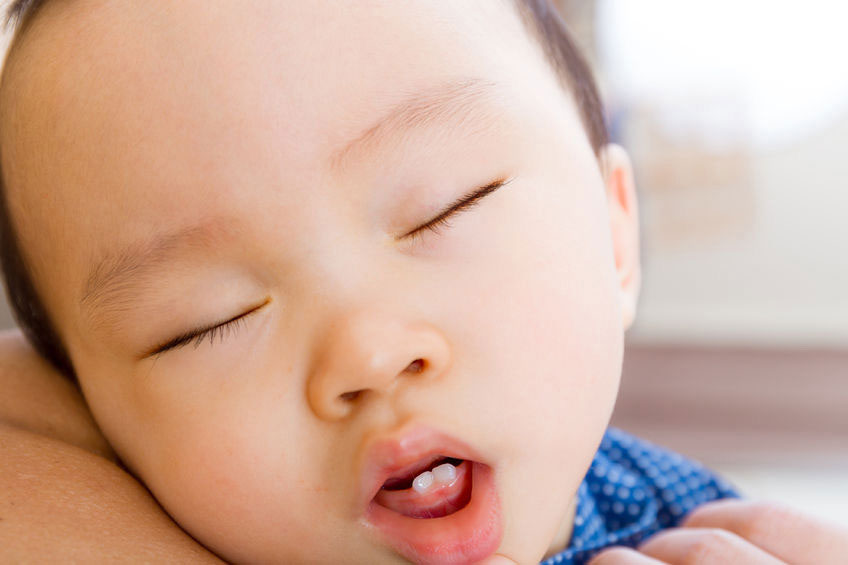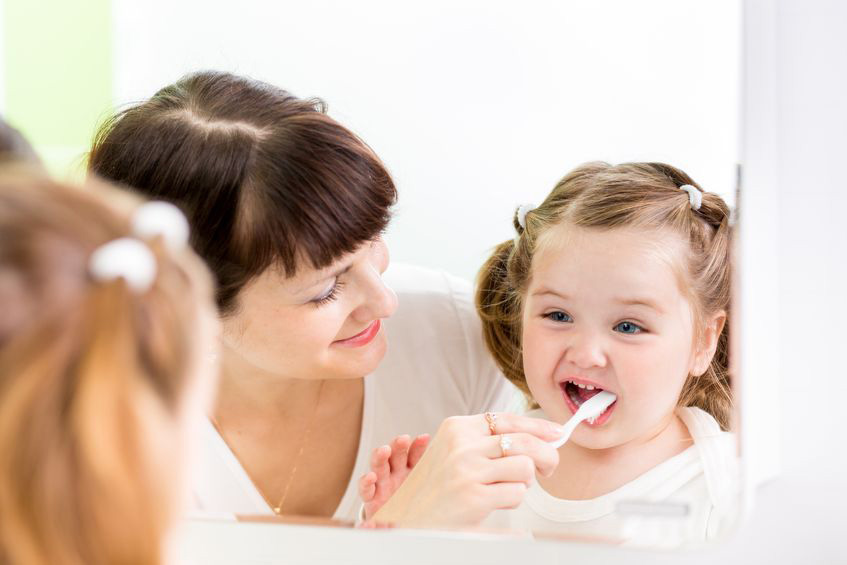Sometimes parents may notice their baby or toddler’s little teeth look marked with brown spots or cavities. There are several risk factors for early cavities such as eating a high sugar diet. Some dentists caution that breastfeeding is a cause of dental decay and a mother may feel pressure to stop breastfeeding. Could breastfeeding be one of the risk factors for early tooth decay?
This article
This article looks at whether breastfeeding causes tooth decay, what research has found, information on other causes of early tooth decay and includes official recommendations for dental teams.
#1 Does breastfeeding cause early tooth decay?
It is biologically normal to breastfeed long after little milk teeth arrive and for as long as mother and baby want. Studies of prehistoric skulls did not find decay in breastfed children 1 suggesting early tooth decay must be caused by something else in, or missing from, the modern child’s diet. Rather than being a cause of tooth decay, breastfeeding protects both a baby’s health and the development of his mouth.2 It would make little evolutionary sense for breastfeeding to harm a baby’s teeth. Dentist Brian Palmer explains:
- If breast milk caused decay – evolution would have selected against it.
- It would be evolutionary suicide for breast milk to cause decay.
What does research say about breastfeeding and tooth decay?
- No link between breastfeeding and tooth decay. Research does not show a link between breastfeeding and tooth decay.3 A large randomised trial by Kramer et al in 2007 followed 13,889 mother baby breastfeeding pairs but found no link between breastfeeding past the baby stage with tooth decay at age six years.4
- Breastfeeding protects teeth. Extended breastfeeding is protective against tooth decay. 5 In 2015 Tham et al 6 reviewed the literature and concluded that breastfeeding may protect against dental caries and Avila et al also found breastfed children were less affected by dental caries than bottle fed children in a systematic review and meta-analysis in the same year.7
- Dietary sugar, not breast milk, causes tooth decay. A study by Erickson and Mazhari found that breast milk doesn’t cause teeth to decay in laboratory tests, unless another carbohydrate source is present e.g. sugary food.8 Lavigne et al also found that decay is associated with sugar in the diet and/or bacteria levels and no evidence of an association of early childhood caries (ECC) with breast milk in isolation.9 Devenish et al found a sugary diet and disadvantaged socioeconomic status (poverty) were associated with ECC.10
- Other risk factors. A study in the United States in 2007 by Hiroko Lida et al, 200711 found risk factors for early tooth decay included poverty, Mexican American ethnic status, and maternal smoking. More recently diet is thought to be the biggest risk factor (see below).1213
#2 How does breastfeeding protect little teeth?
Breastfeeding protects a baby’s emerging teeth in a number of ways including:
- Oral microbiome. Breastfeeding establishes the perfect microbiome (friendly bacteria) to protect the mouth, gut and promote a healthy immune system.14
- Physical development of the mouth and teeth. Breastfeeding uses many muscles, cranial nerves, and the jaw bones working together to help form the mouth optimally which positively promotes dental health.15 Breastfeeding reduces the risk of crooked teeth (see #3 below). 16
- Antibacterial properties and digestive enzymes. Breast milk has many protective antibacterial properties and enzymes so that breast milk lactose (a type of sugar) does not have the same effect on teeth as pure sugar 17 If certain bacteria are associated with cavities (see #5 below) they would be killed by lactoferrin—a glycoprotein in breast milk that carries iron and has a bactericidal action.
- Tooth repair. Milk has been shown to remineralise artificially demineralised enamel in laboratory studies, in other words creating a type of tooth repair process depositing calcium and phosphorus in the enamel.1819
- Protection against dental fluorosis. Breastfeeding appears to protect against the marking/damage to teeth caused by excess fluoride exposure.20
A strong advocate for breastfeeding; dentist and author Steven Lin explains:
If there is one food that shows us how to eat for dental health, it’s breast milk. Breast milk shows us which nutrients a growing baby needs to develop a healthy body and mouth. From there, we can extrapolate what we need for a healthy body and mouth throughout our lives. what’s more, the act of breastfeeding shows us how to develop and maintain strong jaws and airways.


#3 How does breastfeeding affect development of the mouth and teeth?
The mechanics of breastfeeding promotes normal mouth, palate and airway shape, and optimal teeth alignment. These factors can help to reduce sudden infant death syndrome (SIDS), sleep apnea, the need for orthodontics and can promote other future health benefits.21 22 Peres et al2324 found that breastfeeding can reduce the risk of teeth being misaligned (malocclusions).
#4 What causes tooth decay?
Since infant tooth decay is a relatively recent problem in history, what else could be causing early cavities in breastfed children? Risk factors for tooth decay or early childhood caries in infants include:
Diet
- Tooth decay is associated with eating sugary food, including juices, cereals/grains, breads, dried fruit, sweetened medicines252627 28 and formula (see next point). Researchers and authors Steven Lin and Ramiel Nagel discuss a diet for healing teeth in their respective books: The Dental Diet The Surprising Link Between Your Teeth, Real Food and Life-Changing Natural Health and Cure Tooth Decay Heal and Prevent Cavities With Nutrition. The diet includes plenty of the fat soluble vitamins and minerals needed for healthy teeth and bones, plenty of vegetables, enough proteins and limited sugar.
- Infant formula. Milk based infant formula has been shown to cause tooth decay.29 A study by Pamela Erickson, DDS, Ph.D. et al 30 looked at the effects of formula on enamel and found most artificial baby milks reduced the pH (acidity) significantly, supported significant bacterial growth and dissolved enamel. Some caused decay in a matter of weeks.
- Sugar, bacteria and decay. Dentist and author Dr Lin explains that in a healthy mouth, bacteria on the surface of the teeth help to manage the exchange of minerals such as calcium between the saliva and the tooth enamel. However if there is too much sugar, the bacteria will produce a lot of acid and will run out of their own calcium reserves so they begin to take calcium from tooth enamel. If this acid release and calcium depletion goes on for too long there will be tooth decay (Lin, 2018 page 89).
It’s not simply that sugar combines with bacteria to create acid that decays enamel. It’s more that too much sugar sparks a chain reaction that leaches too much calcium from the enamel too quickly. Tooth decay isn’t a bacterial infection. It’s a condition where our diet has effectively forced the bacteria in our mouth into starvation.
Stress factors on baby teeth
- Defective enamel (enamel hypoplasia) is described as an indicator of stress to the teeth that are developing at the time of the stress; for example nutritional stress, infectious diseases, and localised trauma. Hereditary defects are usually severe and affect all the teeth.31 Nilza et al include low birth-weight (including premature births), malnutrition, asthma, recurrent infections, chronic diseases and medication use as risk factors.32
- Fluorosis. Another possible cause of marked teeth could be fluorosis (mottling of tooth enamel due to too much fluoride) see Avoiding Tooth Decay in Toddlers for further reading.
Stress to the mother or foetus during pregnancy
- Maternal stress. Dentist Dr Patrick (Harry) Torney found in his unpublished thesis Prolonged, On-Demand Breastfeeding and Dental Decay – An Investigation, 1992 that maternal stress, illness or a reduced intake of dairy products during the mother’s pregnancy were associated with a high rate of tooth decay for the child.33
- Maternal vitamin D levels during pregnancy. One study indicated a possible association between early childhood caries and low vitamin D levels of the mother during pregnancy.34
Dentists and breastfeeding
Despite the research findings above, some dentists may state that breastfeeding, especially breastfeeding during the night, is a cause of dental decay. However it is biologically normal for babies and toddlers to breastfeed frequently day and night and there isn’t any evidence for this hypothesis. Author Ramiel Nagel states:
Breast milk provides protection from cavities, so night-time nursing does not cause or promote tooth decay. The claim that night-time nursing causes tooth decay is simply anti-breastfeeding propaganda and is not scientifically based.
Possible reasons for dentists to blame breastfeeding include:
Confusion with baby bottle tooth decay or “bottle mouth syndrome”
Ignorance about the differences between bottle-feeding formula and breastfeeding may have led to assumptions that breastfeeding involves the same risk to teeth as formula-feeding. The risks are not the same however. Bottles or sippy cups are commonly associated with causing early tooth decay (Avile et al, 2015) since they usually contain infant formula (see above) or even other drinks such as juice or soft drinks which contain high levels of sugar without the protective balancing factors present in breast milk. Some authors believe that the mechanics of bottle feeding gives greater potential for formula to have more prolonged contact with teeth. 35 However others focus on the sugar levels in the diet generally leading to demineralisation more so than direct contact (Lin, 2018; Nagel, 2012).
Unfamiliarity with natural breastfeeding or personal bias
Dr Jack Newman, Canadian paediatrician and breastfeeding expert, theorises that dentists are not familiar with breastfeeding:
What dentists don’t see is that the vast majority of children who are nursed during the night do not get cavities. Since those who do end up at the dentist’s office, the doctor often concludes that this is a common problem for children nursing past the first year of life. It isn’t. Even if the child is brought to the dentist for a routine check, the dentist will not usually ask about night nursing unless the child has cavities. Most dentists probably have no idea that some or even many of their cavity-free 18-month old patients are still breastfeeding at night.
Recommendations for dental teams
Public Health England says:
- dental teams should continue to support and encourage mothers to breastfeed
- not being breastfed is associated with an increased risk of infectious morbidity (for example gastroenteritis, respiratory infections, middle-ear infections)
- breastfeeding up to 12 months of age is associated with a decreased risk of tooth decay
Breastfeeding is the physiological norm against which other behaviours are compared; therefore dental teams should promote breastfeeding and include in their advice the risks of not breastfeeding to general and oral health.
The American Dental Association says:
we call upon all dental team members to be advocates, promoters and supporters of breastfeeding. We also encourage dental professionals to inform care-givers of the importance of cleansing infants’ teeth as soon as they erupt by using a washcloth or soft toothbrush to reduce bacterial colonization and to help reduce children’s risk of developing ECC [early childhood caries].

Summary
It is biologically normal to breastfeed for many months or years after a baby’s milk teeth first arrive. The idea that breastfeeding causes tooth decay makes no sense biologically, and is not borne out by research. Breastfeeding is too important and has too many health benefits to warrant pressuring mothers to stop or restrict breastfeeding based on opinion or anecdotes rather than evidence. There are many possible causes of tooth decay and it is important to minimise as many risk factors as possible whether breastfeeding or not. For ideas to help protect your children’s teeth see the article Avoiding Tooth Decay in Toddlers.